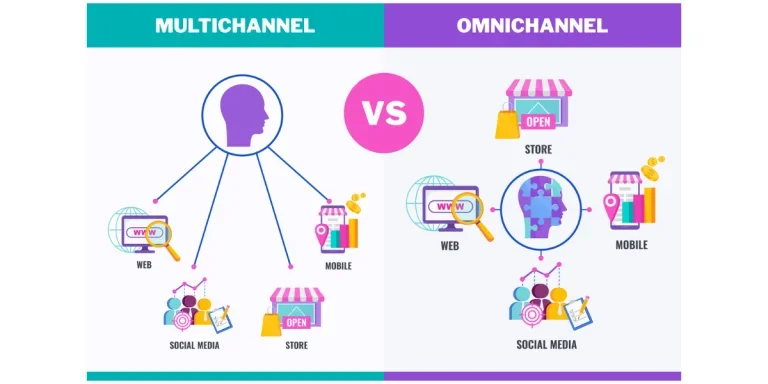You’ve probably heard the terms ‘omnichannel’ and ‘multichannel’ thrown around recently in the marketing world. But do you actually know the difference between the two? And you may even be wondering whether you should care? Spoiler alert: you should definitely care.
Omnichannel and multichannel marketing are hot marketing trends, representing two very different approaches. As a business owner, choosing the right approach can greatly impact how you reach and engage your customers.
Read on to understand the distinctions between omnichannel and multichannel marketing, and discover the best approach for your business in 2024.
Table of Contents
Defining omnichannel and multichannel marketing
How does omnichannel marketing work?
How does multichannel marketing work?
Key differences between omnichannel and multichannel marketing
How to choose between omnichannel and multichannel marketing
The bottom line
Defining omnichannel and multichannel marketing
Omnichannel marketing, in simple terms, means providing a seamless customer experience across all channels like web, mobile, brick-and-mortar stores, call centers, and social media. It enables your customers to shop wherever, and however they want while your brand recognizes them and what they prefer at every touchpoint.
Multichannel marketing, on the other hand, means that a company is present on multiple channels, but you do not necessarily provide an integrated experience. For instance, a customer may get an email offer for things they recently viewed on a website, but the store associate may likely not have that information when they shop in person.
How does omnichannel marketing work?
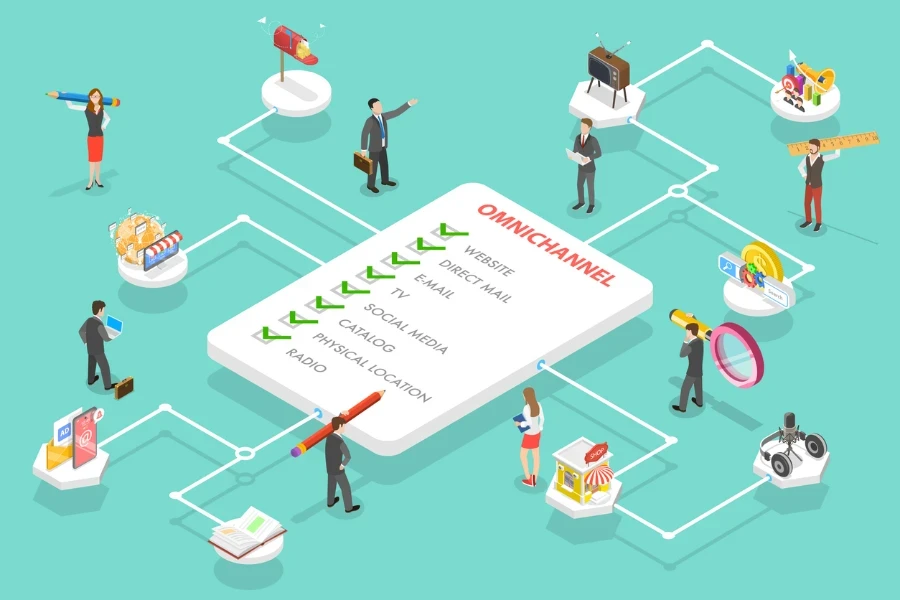
We now know omnichannel marketing provides a seamless customer experience across channels. But how does it work?
Instead of each channel operating separately, omnichannel marketing integrates them. When customers shop on your website, the system recognizes them as the same customers who bought in-store last week. It then shows them recommendations based on their full purchase history and preferences, not just what they viewed on your website.
Omnichannel also means consistent branding and messaging across channels. The colors, logos, language, and offers they see in email marketing, social media, and prints are the same as in-store and in the website. This unified experience builds customer trust and familiarity with your brand.
In addition, omnichannel marketing lets a customer start a transaction in one channel and complete it in another. For example, a buyer may find a product on the website and save it on their cart. When they visit the store, the item is still in their cart, ready to purchase or return.
It shows omnichannel marketing recognizes a customer at every touchpoint, allowing a seamless handoff between your digital and physical channels.
However, to implement an omnichannel strategy, you need robust customer data and analytics to gain a 360-degree view of your customers. You also need a shared inventory and order management across your organization. Omnichannel is a long-term strategy, but by focusing on consistent customer experiences across all your channels, you’ll build deeper, more valuable relationships.
Benefits of implementing omnichannel marketing
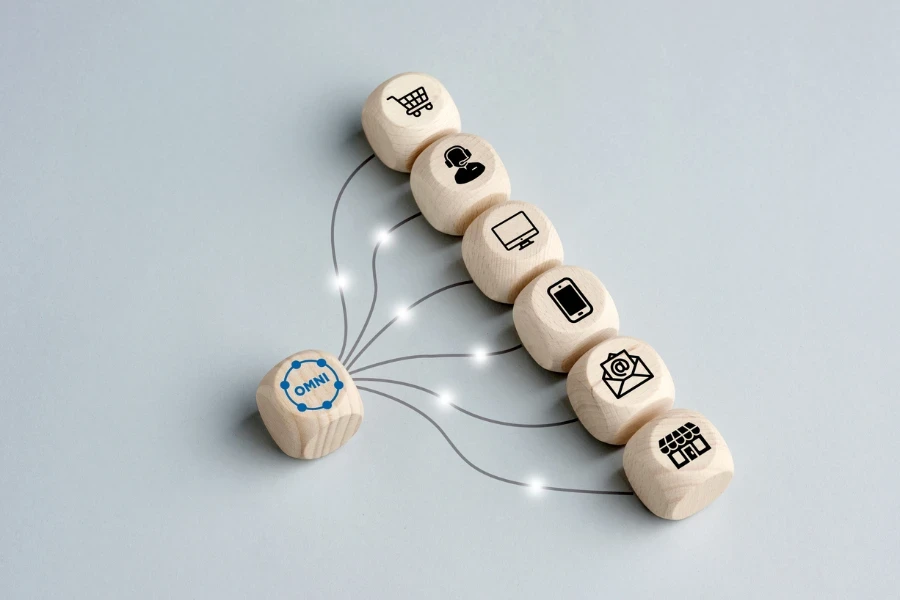
After understanding how omnichannel marketing works, you might wonder what benefits it has for your business. Here are the key benefits you gain from incorporating an omnichannel marketing strategy.
- You gain a single view of the customer. In omnichannel marketing, data is integrated across channels, which allows you to see customer interactions holistically. It becomes easy to know their individual browsing habits, purchases, service requests, and more. This 360-degree view aids in personalization of ads tailored to your customers as well as services.
- You enable consistent experiences. An omnichannel approach ensures customers have a uniform regardless of channel. Your brand message, visual identity, and key offerings are aligned across channels. Furthermore, there are no disconnects as customers switch from one channel to another.
- You increase customer loyalty. Omnichannel customers spend more and are more loyal. The seamless experience across channels makes it easy to keep engaging with your brand. According to a Harvard Business Review study, omnichannel customers who engaged with the brand on multiple channels visited their brick-and-mortar store 23% more often over six months. The personalized interactions make the connection with your customers stronger. Loyal customers also provide word-of-mouth marketing by recommending your brand to others.
How does multichannel marketing work?

Multichannel marketing allows businesses to reach potential customers through multiple channels, like
- Radio and TV advertising
- Your website
- Social media platforms
- Direct mail
- Mobile apps, and
- Physical stores
The goal of this strategy is to spread marketing efforts across multiple channels to increase brand awareness and sales. An investment is, however, required to spread the message across many channels, which can be costly.
Multichannel marketing, therefore, focuses on optimizing each channel separately to drive the most traffic and conversions. The channels are managed individually, with different content and campaigns for each. While this approach can be effective at generating more leads and sales, the experiences may feel disjointed for customers as offers and messages are not always consistent.
For businesses, multichannel marketing also means more complexity in managing different tools, technologies, and teams for each channel. In addition, it is difficult to get a single view of customer data and behavior across channels, making optimization and personalization challenging. It is also hard to track customer journeys and attribution across the many channels.
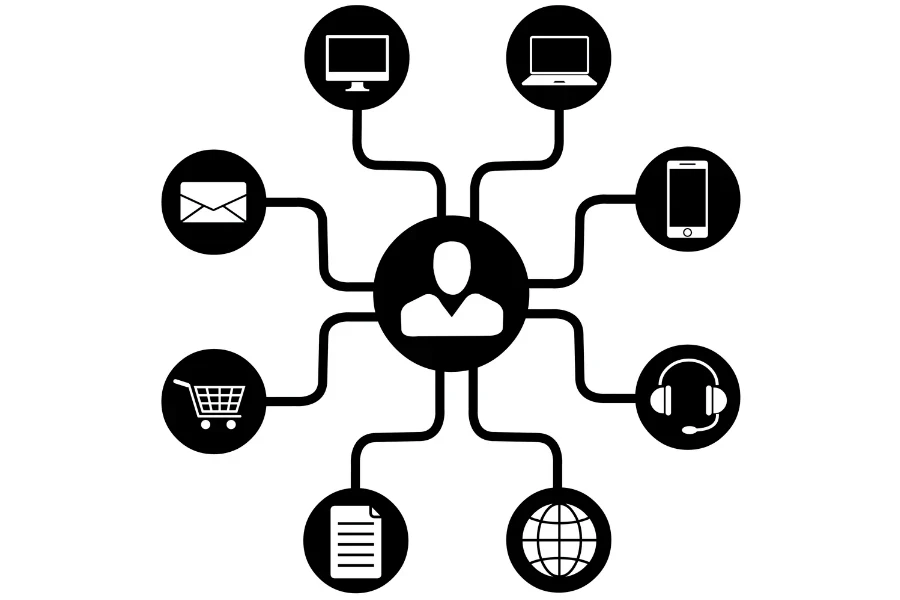
Although multichannel marketing exposes your brand to more people, the lack of consistency can confuse customers. To be effective, multichannel marketers need to ensure a consistent brand identity and voice across channels, as well as coordinate offers and promotions to avoid confusion.
Finding ways to track customers across channels to target them better and invest in the channels that reach your target audience will also boost your multichannel marketing efforts. Continuous optimization of each channel and overall marketing performance is another way to make the most out of this strategy.
While multichannel marketing may have its challenges, using a mix of channels is still an effective way for businesses to reach customers. The key is to find the right balance of consistency and personalization for your brand.
Benefits of multichannel marketing

Multichannel marketing facilitates reaching your clients through multiple channels like social media, email, and your website. This broad reach has the following benefits for your business.
- Increased brand awareness. Multichannel marketing allows you to promote your business across several channels, which boosts brand visibility and helps more people discover your company. The more people see your brand, the more trusted and familiar it becomes.
- Higher conversion rates. Customers who interact with your brand on multiple channels are more likely to make a purchase. Multiple studies show that multichannel shoppers spend three to four times as much as single-channel customers.
- Valuable customer data. Interacting with customers on multiple channels gives you more data to gain insights into their needs. You can then use this information to better personalize messaging and offers for each channel. Understanding your customers on a deeper level gives you the ability to serve them even better.
Key differences between omnichannel and multichannel marketing
Now that we understand how these two marketing approaches work, the differences between omnichannel and multichannel marketing are clear. Below are the key differences to note about these marketing angles.
1. Customer experience in omnichannel vs. multichannel
Omnichannel marketing provides a consistent, personalized experience across channels. Customers can start shopping on one channel and finish on another.
On the other hand, the experience varies between channels as there is no continuity or personalization across channels. Rather than being customer experience-oriented, multichannel largely centers around your products or services.
2. Data use in omnichannel vs. multichannel
In omnichannel, data is integrated across channels to provide a holistic view of the customer. The data is then used to personalize messaging and offers.
For multichannel, data is siloed within each channel; therefore, it provides no single view of the customer across channels.
3. Inventory in omnichannel vs. multichannel
Omnichannel: Inventory is integrated across channels, so customers can choose to purchase or pick up in-store or have items shipped.
Multichannel: Inventory is managed separately for each channel. For example, there is limited ability to buy online and pick up in-store or vice versa.
How to choose between omnichannel and multichannel marketing
So, how do you decide between omnichannel and multichannel marketing for your business? It comes down to analyzing a number of factors. Here are some things to consider when choosing the marketing strategy to prioritize.
1. Your resources
Omnichannel marketing typically requires more resources to implement since you need to integrate all channels to provide a seamless experience. If you are a small business with limited resources, a multichannel approach may be more realistic. You can start with a few channels like email, social media, and your website to engage with your customers.
2. Your customer journey
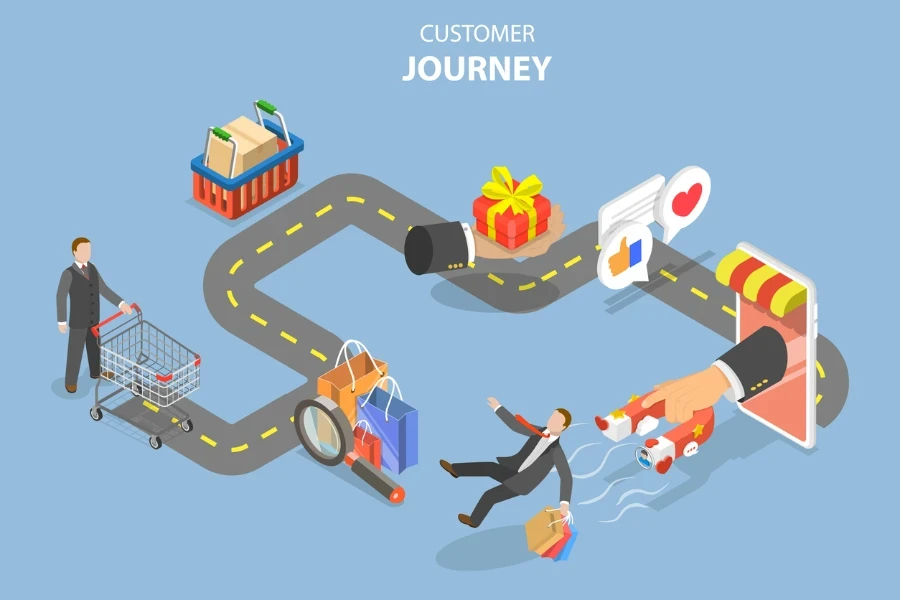
Think about the path your customers take to purchase and engage with your brand. If they use multiple channels, omnichannel is probably better to provide a consistent experience across channels. If your customers stick to one or two channels, multichannel should work fine.
3. Measurement
With omnichannel, you need to track customer interactions across channels, which requires advanced analytics and attribution modelling using CRM software. On the other hand, multichannel marketing is easier to measure since you can analyze each channel separately. If data-driven decision-making is important, omnichannel provides a complete view of the customer journey.
4. Your goals

Are you focused on acquiring new customers, improving loyalty, or driving more sales? Omnichannel helps to enhance the customer experience, which leads to greater loyalty and lifetime value. Multichannel may be better if your goals are broad reach and brand awareness since you can focus on selected channels.
5. Complexity
Omnichannel has greater technical and operational requirements to integrate systems and data, align customer experiences, and share information across channels making multichannel marketing more straightforward to implement with fewer interdependencies between channels.
6. Brand consistency
If you want a consistent visual identity and visual identity across all channels, opt for omnichannel marketing. Multichannel marketing risks inconsistent brand representation if the channels are not well connected.
In the end, you need to analyze your unique situation. Don’t feel pressured into an omnichannel approach if multichannel marketing will achieve your goals. You can always start with multichannel, build your resources, and then transition to omnichannel when the time is right for your business. The most important thing is choosing the strategy you can implement successfully.
The bottom line
This article gives an in-depth look at the differences between omnichannel and multichannel marketing. Depending on your needs, pick and incorporate a strategy in your business today to start increasing your sales and conversion rate. Learn more about omnichannel e-commerce strategies here.
